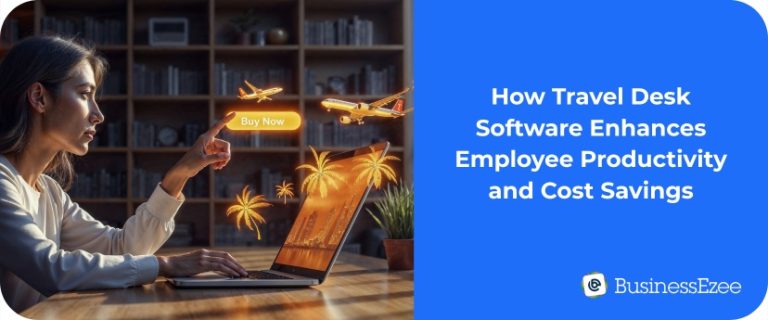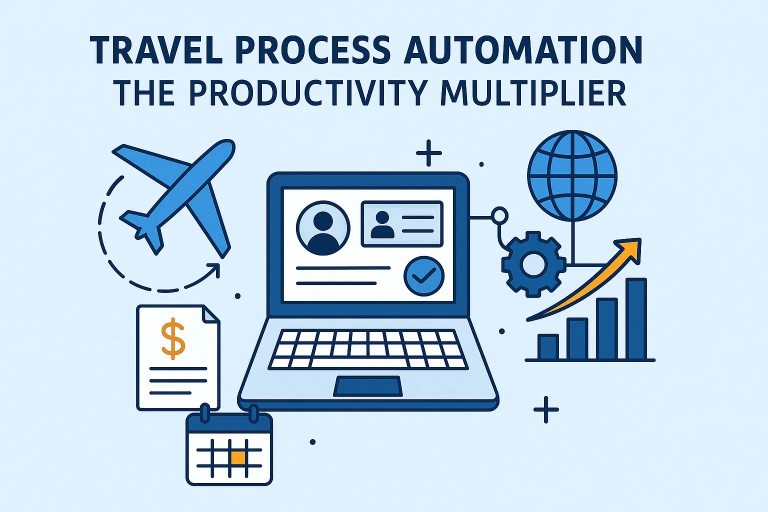How Travel Desk Software Enhances Employee Productivity and Cost Savings
Managing corporate travel in today’s turbocharged business world can be less than a tank of gas, from flights and hotels to surveillance expenses and policy compliance, as the management of travel the old-fashioned way can drag out processes while incurring mistakes and hidden costs. Thanks to travel desk software, a revolutionary tool for travel management that not only manages travel processes efficiently but also adds to employee productivity, saves companies significant amounts of costs, and is easy to implement and integrate.

What is Travel Desk Software, and why is it important?
Travel desk software is a dedicated technology-based solution to automate and centralize your entire corporate travel management process. It is a single place to manage travel requests and bookings, expenses and expense reporting, and analytics.
The need for travel desk software has grown significantly as corporate travel programs have grown and global travel restrictions forced companies to optimize their operational processes to manage costs.
Key Features of Travel Management Software That Drive Productivity
Modern travel management software has some key features that inherently support increased employee productivity:
Automated Ticketing System
An automated ticketing system streamlines travel requests, boosts productivity, and frees managers to focus on strategic priorities.
Set Your Approval Workflows
With integrated automated approval workflows, travel requests that once took days can now be approved in minutes
One Source of Truth
Travel management software offers a single source for all travel information and actions, eliminating the need to switch between muliple systems. Customisation is available.
Mobile Devices for Easy Use
Mobile access empowers employees to manage travel tasks on the go, from booking to approvals, anytime, anywhere.
How Travel Software Solutions Streamline Business Processes
The best travel software solutions improve almost every travel management process as they take care of the entire travel management lifecycle, from booking to expense reconciliation for all stakeholders involved, and in an efficient manner. Automating monotonous tasks and simplifying and standardizing processes allows for the elimination of inefficiencies, while also negating any potential errors.
One of the biggest improvements travel software solutions make on business processes is through integration. Modern travel software solutions can integrate with existing enterprise software applications, including:
– Expense management applications
– HR applications
– Accounting applications
– Calendar applications
– Payment processing applications
Using integrated systems ensures data can flow freely from each point in the lifecycle without the need for manual, and often misinterpreted, data entry. For example, when an employee books a trip using the travel software, the trip details can flow automatically to a calendar, while the employee’s financial information can flow into the expense management solution.
The best travel software solutions will allow users to customize their dashboards to see real-time travel spend, allowing managers to see their budgets and spending habits in a timely manner without having to initiate and compile reports.
Travel Process Automation: The Productivity Multiplier
Travel process automation also takes away the need to manually complete repetitive tasks and reduces the risk of human error, and infection can be a major multiplier on productivity across the rest of your organization.
The productivity gains from automating travel processes include not only time savings. Organizations that have successfully implemented travel process automation have seen productivity gains of more than 90%.
Some key working areas where new technology incorporates automatio,n resulting in productivity gains, include:

Pre-trip Planning – Automated suggestions for flights, hotels, and transportation, considering company policy and traveller preferences
Booking Process – One-click reservations within company policies
Approval workflows – Automated processing of requests to the appropriate approvers and reminders
Expense reporting – Automated expense categorization and expense report generation
Policy compliance – Automated workflow policy checks against company policies, in real-time at the time of booking, rather than post-facto
The better travel process automation tools will adapt to suit your existing workflows rather than make you change the way you work.
Corporate Travel Booking Software: The ROI Perspective
Considering corporate travel booking software from an ROI standpoint also highlights the value proposition. Typically, your first investment in travel management technology can deliver a return on investment in both hard cost savings as well as productivity improvements.
Corporate travel booking software with policy enforcement capabilities will not only enable compliance but also allow corporate clients to have traveller flexibility, creating the right balance between cost control and traveller satisfaction.
From an ROI perspective, you will typically receive a return on your corporate travel booking software investment within the first year of implementation. Return on your investment will come from multiple sources:
- By not having to spend money on booking fees, which you are avoiding by connecting directly with the suppliers.
- Lower average ticket price due to policy compliance.
- Lower average processing cost when registering travel requests and expense reports.
- Time savings for travellers and travel managers.
- Greater purchasing negotiating power with suppliers, due to consolidated information.
Implementing a Travel Management Solution: Best Practices
When it comes to implementing a travel management solution, employee training is essential to realize the maximum user adoption and returns. Even the best, most powerful software won’t work if employees don’t know how to leverage the system or if employees refuse to adopt the system.
There are generally three aspects of a successful implementation:
Pre-Implementation Phase
- Assessment & Planning: Assess your current travel processes to identify problems, and include stakeholders from each department to ensure all needs are solicited.
- Vendor Selection: Select a solution that meets your needs and focuses on user experience, integration, and support.
Implementation Process
- Technical Setup: Work closely with the vendor to configure the system according to your organization’s policies and workflows. This includes data migration, system configuration, and integration with existing systems.
- Training and Support: Develop comprehensive training materials and conduct sessions for all user groups. Create support resources such as quick reference guides and FAQ documents to assist users after launch.
Post-implementation
- Monitor and Optimize: Evaluate key performance indicators on an ongoing basis to evaluate the performance and success of implementation.
Collect users’ feedback from them, and make changes in the system they are using to improve efficiency.
Conclusion
Travel desk software is a powerful tool for companies seeking to optimize traveler productivity while realizing significant cost savings on their travel programs. By automating repetitive work and workflows and providing full visibility over travel spending, these solutions assist companies with a significant portion of the hurdles that accompany corporate travel management.
However, the benefits also go beyond savings and productivity efficiencies. Other value-adds include improved policy compliance, enhanced traveler satisfaction, and better risk management.
Get started with Businessezee now and take the first step toward sustainable business growth.

